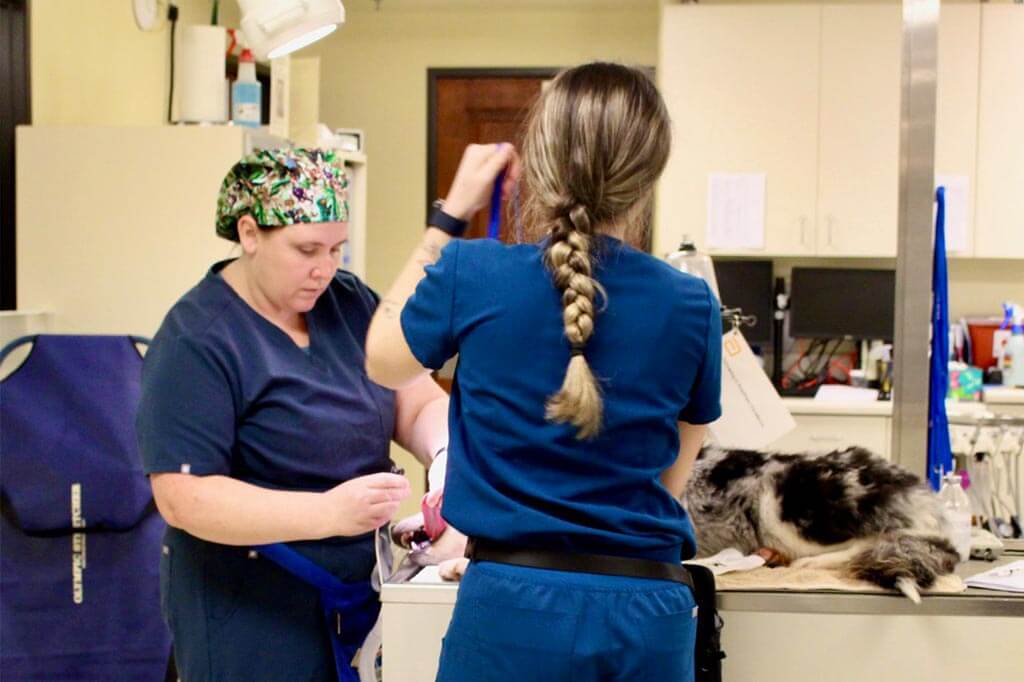Quality Dental Care for Folsom Dogs & Cats
Blue Ravine Animal Hospital provides veterinary dentistry services for dogs and cats. A healthy mouth is important to the overall health and wellbeing of your pet.

Does My Pet Need Dental Care?
Many people are surprised to learn that their pet needs dental care. The truth is that pets have a higher incidence of dental disease than humans. Some form of dental disease is found in 85% of all pets over two years old.
Dental Disease
Unlike people, dogs and cats rarely get cavities. They are instead much more prone to gum and periodontal disease related to buildup of tartar on the teeth and gums. If tartar is not removed once it has reached this stage, the gums could separate from the teeth to form pockets, which encourages additional bacterial growth.
At this point the damage, called periodontal disease, is irreversible. It can be very painful and can lead to loose or lost teeth, abscesses, and bone loss or infection. As bacterial growth continues, the bacteria may enter the bloodstream. This can cause infection of the heart valves, liver, and kidneys.
If treated by your veterinarian, periodontal disease can be slowed or stopped. To prevent dental disease, your dog or cat needs routine dental care at home. But to perform good home care, you need to start with clean teeth.

Routine Veterinary Dental Cleaning
During your pet’s wellness exam, we will evaluate your pet’s oral health. If tartar has formed on your pet’s teeth, it is necessary for us to remove it during a dental cleaning. Your pet will be treated with loving care throughout the procedure and recovery.

Routine dental cleaning consists of:
- Anesthesia & Monitoring: The procedure will be completed under anesthesia for safety and comfort. A member of our team will monitor your pet’s vitals throughout the procedure and recovery.
- Flushing the Mouth: We flush your pet’s mouth with a solution to kill bacteria.
- Dental X-rays: We perform dental X-rays to fully examine below the gum line.
- Cleaning & Polishing: We use handheld and ultrasonic scalers to clean the teeth. The teeth are then polished to remove microscopic scratches, which lessens the surface area for tartar to form.
- Tooth & Gum Inspection: Each tooth and the gum around it get inspected for any signs of disease.
- Follow Up: Any abnormalities or additional recommended procedures on your pet’s dental chart. We will work with you to determine the best follow-up and home dental care program for your pet.

Home Oral Care and Cat or Dog Teeth Cleaning Tips
Routine, daily, at-home brushing can help prevent periodontal disease. Home oral care includes brushing his or her teeth, and doing routine examinations of your pet’s mouth.
Home Oral Exam
As you care for your pet’s mouth, look for warning signs of gum disease such as bad breath, red and swollen gums, a yellow-brown crust of tartar around the gum line, and pain or bleeding when you touch the gums or mouth. You should also watch for discolored, fractured, or missing teeth. Any bumps or masses within the mouth should also be checked by your veterinarian.
Daily Brushing
Regular brushing of your pet’s teeth is a very important way to prevent oral diseases. Also, studies show that hard kibbles are slightly better than canned food at keeping plaque from accumulating on the teeth. There are veterinary dentist-approved foods and treats on the market that help pets have less plaque and tartar buildup.
Please call us to set up an appointment or to discuss any questions you may have regarding your pet’s oral health needs.




